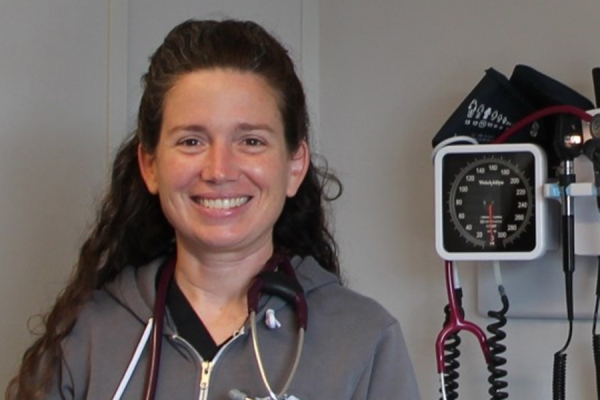
Researcher Jennifer Bondy is seeking to overcome barriers to health care for those experiencing homelessness.
There are about 851 households experiencing homelessness in Windsor-Essex, and according to researcher Jennifer Bondy, that number is unlikely to decrease without proper access to health care.
The region experienced a 27 per cent increase in its homeless population between 2018 and 2021. But it's not a trend unique to the area; many jurisdictions are facing the same issue.
To address the health care needs of this growing population, Dr. Bondy, an adjunct professor in family medicine at the Schulich School of Medicine & Dentistry, led a research project funded by a WE-Spark Igniting Discovery grant. The project, "Understanding the Landscape for a Shelter Health Initiative," brought together community partners to conduct a needs assessment study.
"These are all professionals working in the field, each with their own focus, and I wanted to bring them together. When WE-Spark announced the think tanks, I saw an opportunity to create a research team," Bondy said. "The idea was to gather people from different sectors to collaborate, think ahead, and plan programs. Then we would have an embedded research team for continuous quality improvement, ensuring that what we offer truly meets the needs of the community we serve."
She said step one was speaking to frontline workers and getting their perspective on what they would like to see to better help their clients.
"Overwhelmingly, they said they would like to see health-care services on-site at shelters," Bondy said.
She explained a large reason for that response is there are known barriers to accessing care for those experiencing homelessness. Bondy said there is evidence to suggest that much of that population has experienced stigma when trying to receive health care, which may result in a mistrust of the system and reluctance to visit doctors' offices or emergency rooms.
"Having something on-site, where we meet them in their environment instead of expecting them to come to us, is helpful for them. However, other barriers were identified, such as limited transportation. While the city isn't geographically large, a lack of access to a car or bus, money for a taxi, or even a bike being stolen can make it very difficult to get around," Bondy said.
Care services requested at shelters included harm reduction, wound care, counselling and primary care for issues such as coughs, colds, injuries and blood pressure checks.
"Finally, we learned that while frontline workers find it relatively easy to navigate social services, they struggle more with health care referrals," Bondy noted. "This is where we can help as health-care providers. By being on-site, we can better understand the barriers faced by both clients and workers and work to reduce these obstacles to improve follow-up care."
Bondy said the research team sought funding from various sources to implement their findings. After partnering with the Canadian Mental Health Association Windsor-Essex for primary care team funding, they secured additional funding to hire more medical professionals for the shelter system.
"We'll have six physicians working part-time within the system, and we have three full-time nurses and more people being onboarded every day," she said. "So, there's been an explosion in the capacity to provide care since the survey was done."
According to the By-Names Priority List compiled by social service providers in Windsor, there are 851 households currently experiencing homelessness, 527 of which are experiencing chronic homelessness, meaning they have been homeless for at least six months out of the last year, Bondy explained.
She cited several factors contributing to homelessness, including the impacts of COVID-19, job losses, housing affordability, inflation, abusive home situations, and poor health.
"If people are in poor health, and if they have a health issue that doesn't allow them to work, they're not going to be able to afford many things. Poor health can therefore lead to homelessness, and homelessness also leads to poorer health outcomes. So, it's this terrible cycle for people that ends up being hard to get out of," Bondy said.
"That's why we say housing is health care."
Students are now developing a manuscript from the project, which will serve as a baseline for creating and supporting programs to improve health care access. Additional research is ongoing to inform local and broader health responses to homelessness.













